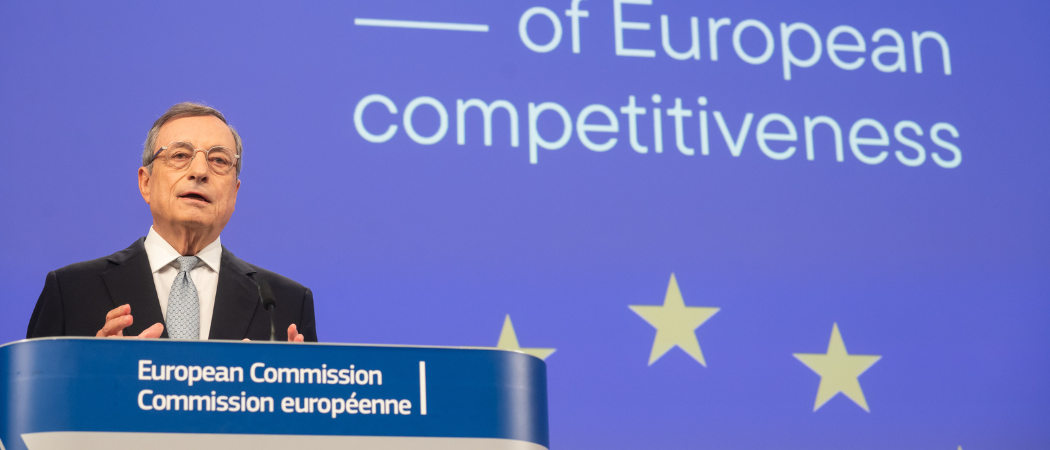Stakeholders are happy to see the prominence given to research, but there is disagreement over proposed reforms to EU instruments

Former Italian prime minister, Mario Draghi. Photo credits: Aurore Martignoni / European Union
Research and innovation have never been more present in mainstream policy debates after this week former Italian prime minister, Mario Draghi, placed research and innovation at the heart of his recommendations for boosting EU competitiveness.
That followed on from an earlier report by another former Italian prime minister, Enrico Letta, on the future of the single market, in which he called for a ‘fifth freedom’ for research and innovation.
The Draghi report is expected to have a major role in shaping EU policy over the next five years, and the research community is naturally delighted by its call for more public research and innovation funding, including €200 billion for the successor to Horizon Europe to run from 2028-2034, Framework Programme 10 (FP10).
But beyond the headline recommendations, there are conflicting opinions about how research spending should be organised in the future.
Thomas Jørgensen, director for policy coordination and foresight at the European University Association, welcomed the report, which he sees as a “pretty frontal attack” on the so-called frugal member states that refuse to increase public spending.
However, while he agrees with the report’s assessment that Horizon Europe is in need of simplification, Jørgensen is concerned the proposal to focus on a smaller number of priority areas in FP10 could result in an unbalanced programme that is too heavily influenced by the political priorities of the day.
The League of European Research Universities (LERU) is also “very happy” with the report, which picks up on many of its recommendations, secretary general Kurt Deketelaere told Science|Business. “If the Draghi plan becomes too difficult to implement in full […] I hope that nonetheless many individual ideas from the research and innovation chapter can be picked up by the new commissioner,” he said.
Draghi lays out seven principles to guide research and innovation policy, including European values, inclusiveness and accessibility, and excellence. The latter should especially be at the heart of all policy choices, Deketelaere said. “Too much money is spent on initiatives where excellence, and excellence only, is not the selection criterion; satisfying everybody by giving everybody a little bit of money is counterproductive.”
He was however disappointed at the continuous use of the term “innovation”, when much of the report deals with both research and innovation. “This reinforces again the idea in some HQs that a lot of innovation is possible without basic and/or applied research,” he said.
In 2019, the research community had to petition the European Commission so that the portfolio for “innovation and youth” would explicitly reference research, and it is ready to mobilise once again to ensure there is a commissioner for research and innovation in the new mandate.
Science Europe, which represents public research funding and performing organisations, welcomed the call to double the FP10 budget and double the support for basic research through the European Research Council (ERC). It also acknowledged the complexity of the Horizon Europe grant application process, as highlighted in the report. “[It] can be a significant barrier for many researchers,” the association said.
Old-fashioned
Draghi recommends that excellence is promoted by increasing the ERC budget, setting up an ‘ERC for Institutions’ (ERC-I) programme, and creating an ‘EU Chair’ position to retain top academics by hiring them as EU officials.
Jørgensen feels the proposals about universities are “old-fashioned”, from “the last millennium”, and lacking in creativity.
“Saying we should do like the Americans and focus our funding on specific, place-based institutions – that’s not serving the innovation gap in Europe and it’s also not the way research really works these days,” he said. “We’ve seen good results in Europe by having a network of institutions, setting up diverse teams across borders.”
He is also unconvinced by the idea of EU Chairs. “It would be nice not to be restrained by rules around salaries when hiring top scientific staff, but it smacks a bit of the lone brilliant investigator who carries the field forward. Many parts of science are done by large teams.”
Mattias Björnmalm, secretary general of CESAER, an association of European universities of science and technology, says the proposals are promising, but notes that similar work is already taking place within the Marie Skłodowska-Curie Actions (MSCA) programme.
“Doubling MSCA’s funding (together with doubling of FP10) and extending its scope would be a more effective way to attract top talent and foster mobility across Europe. It is frankly surprising that MSCA is barely mentioned in the report, despite several of its key objectives and features being prominently discussed as key for future productivity and prosperity in Europe,” he said.
LERU would welcome the proposed initiatives, and Deketelaere agrees with the statement that there are many very good universities in Europe, but not enough excellent ones. However, he was also disappointed the MSCA was not referenced.
Deketelaere similarly notes several important proposals for closing the skills gap, such as improving life-long learning and attracting highly-skilled workers from outside the EU, but he says it is “surprising” that there is no reference to the Commission’s announcement earlier this year of a European degree, and little mention of European University alliances.
Fragmentation
Draghi also calls for better coordination of public research and innovation expenditure across EU member states, via a ‘Research and Innovation Union’ and a ‘European Research and Innovation Action Plan.’
“As the Draghi and Letta reports highlight, only a Europe-wide approach will enable us to leverage the strengths of our continent and fully integrate the European research ecosystem, to leverage the full strength of our continent and be a global leader in science and technology,” Björnmalm said.
This more Europe-centric approach recommended by the report would prioritise collective EU-wide ambitions, rather than national value for money. Björnmalm hopes this message will be picked up by the expert group report on FP10, due next month. “This outdated mindset of seeing the EU funding programme as primarily a means to redistribute member states’ funds limits Europe’s potential to become a global leader in science and technology,” he said.
Another ambition that’s regularly floated making it into the Draghi report is the creation of a new funding instrument modelled on the US advanced research project agencies. It is suggested this would be done by reforming the European Innovation Council’s (EIC) pathfinder instrument which supports deep tech projects. Björnmalm notes strong similarities with the European Competitiveness Research Council proposed by CESAER.
This should be a priority, said Deketelaere. “If we want to build the future research and innovation policy around ERC and EIC, certainly the EIC needs the reforms as Draghi indicates.” At the same time, the proposal for the new agency to promote dual use (civil and military) innovation would have to be monitored, he said.
Support for industry
The bulk of the full 328-page report is dedicated to detailed policy recommendations for specific sectors including clean technologies, semiconductors, defence, and pharmaceuticals, and addresses issues industry has been complaining about for years, such as burdensome regulations and access to capital. It also includes recommendations to support the development of AI models in several strategic industries.
Cecilia Bonefeld-Dahl, director general of the trade association DigitalEurope, said the report provides “a long list of positive ideas” including simplifying AI regulation, better commercialisation of research, and integrating technology into strength industries.
Nathalie Moll, director general of the European Federation of Pharmaceutical Industries and Associations, said the publication “shows ambition at the highest level” to address the issues facing the pharma industry, with Europe struggling to attract R&D investment.
“The report’s emphasis on strengthening the European Health Data Space, promoting multi-country clinical trials, and enhancing the use of artificial intelligence in healthcare presents a real opportunity to accelerate the development of orphan medicines,” said Virginie Bros-Facer, chief executive of Eurordis, an alliance of rare disease patient organisations.





 A unique international forum for public research organisations and companies to connect their external engagement with strategic interests around their R&D system.
A unique international forum for public research organisations and companies to connect their external engagement with strategic interests around their R&D system.